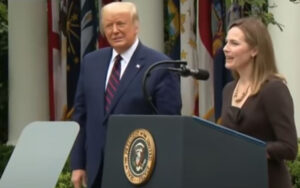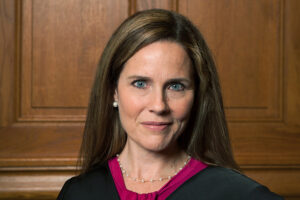Baptist Press

Judge Amy Coney Barrett accepts her nomination to the Supreme Court after being introduced by President Donald Trump. — CNN screen capture
WASHINGTON — President Donald Trump has announced his nomination of Judge Amy Coney Barrett to the U.S. Supreme Court to fill the seat vacated by the passing of Justice Ruth Bader Ginsburg.
Here is what you should know about Judge Barrett, nominee for associate justice of the Supreme Court of the United States.
Age: 48
Birthplace: New Orleans
Education: B.A. from Rhodes College; J.D. from Notre Dame Law School.
Current judgeship: U.S. Court of Appeals for the Seventh Circuit (appointed in 2017 by President Trump).
Previous roles: Judge Barrett previously taught constitutional law at Notre Dame before being appointed to her current judgeship. Prior to teaching, Barrett clerked for Justice Antonin Scalia and Judge Laurence Silberman of the Court of Appeals for the D.C. Circuit.
Religious denomination: Roman Catholic
Family: Judge Barrett is married and has seven children. Two of her children are adopted from Haiti, and one has special needs.
Judicial philosophy: Judge Barrett is a proponent of originalism, a manner of interpreting the Constitution that begins with the text and attempts to give that text the meaning it had when it was adopted; and textualism, a method of statutory interpretation that relies on the plain text of a statute to determine its meaning. Judge Barrett has previously voiced support for the judicial doctrine of stare decisis (or, following existing precedent) while maintaining that prior precedent is not sacrosanct.
Positions and rulings: Judge Barrett signed onto a statement of protest in 2012 as she objected to the birth control mandate for employers of religious orientation. The statement proclaimed the birth control mandate as an “assault on individual liberty and the rights of conscience.”
In Kanter v. Barr, Barrett filed a dissenting opinion arguing that Kanter, a felon convicted of mail fraud, should be allowed to own a gun.
In her dissent, Barrett wrote, “Neither Wisconsin nor the United States has introduced data sufficient to show that disarming all nonviolent felons substantially advances its interest in keeping the public safe. … Absent evidence that [Kanter] either belongs to a dangerous category or bears individual markers of risk, permanently disqualifying Kanter from possessing a gun violates the Second Amendment.”
In 1998, Barrett co-authored an essay titled “Catholic Judges in Capital Cases.” In this essay, Barrett and the other authors argued “litigants and the general public are entitled to impartial justice, which may be something a judge who is heedful of ecclesiastical pronouncements cannot dispense.”
Subsequently, the authors suggest Catholic judges might need to recuse themselves in capital cases on account of “the moral impossibility of enforcing capital punishment.” However, in her 2017 Senate Judiciary Committee hearings, Barrett walked back her statements from 20 years prior saying she does not believe the same things now.
In a dissenting opinion in the case of Cook County v. Wolf, Barrett argued that litigation on the public charge rule – a rule which would deny permanent residency to immigrants which the government believed would need assistance in the future – should have proceeded. In her dissent, Barret argued the courts are “not the vehicle for resolving policy disputes.”
In 2019, Barrett joined a majority opinion in Price v. City of Chicago which, citing binding Supreme Court precedent, upheld a city ordinance which prevented “sidewalk counselors” from approaching women entering an abortion clinic.
Attacks on Barrett’s faith: Since the time Barrett was first floated as a possible replacement for former Justice Kennedy’s seat in 2018, she has received criticism on the basis of her religion. Recently, multiple news outlets disparaged Barrett’s faith by attempting to connect her beliefs to the dystopian novel The Handmaid’s Tale by Margaret Atwood. Previously, California Sen. Dianne Feinstein questioned Barrett’s fitness as a judge, telling her: “[Catholic] dogma lives loudly within you.”
The Constitution prohibits religious tests for office, including judicial appointments.
During the confirmation hearing for her appointment to the Seventh Circuit District of Appeals, Barrett responded to questions regarding the role her Catholic faith plays in her jurisprudence, saying: “If you’re asking whether I take my faith seriously and I’m a faithful Catholic, I am. Although I would stress that my personal church affiliation or my religious belief would not bear on the discharge of my duties as a judge.”
Additionally, Barrett’s comments during Notre Dame Law’s 2006 commencement ceremony have come under scrutiny: “And that is this: that you will always keep in mind that your legal career is but a means to an end, and as [Father Jenkins] told you this morning, that end is building the kingdom of God.”
In the same speech, Barrett further explained, “While we are a community engaged in the enterprise of legal education and scholarship, we are also a community engaged in the enterprise of bringing about the kingdom of God. We are a community characterized by our love and concern for one another.”
ERLC support: ERLC President Russell Moore supports Barrett’s nomination, saying:
“I have long respected Judge Barrett, not only as a highly accomplished jurist but also as an adoptive parent active in the advocacy for adoption and for special needs children. As she goes before the Senate Judiciary Committee, I’m confident she will lay out a thoughtful defense of commitment to the Constitution and the proper limits of judicial authority in our system of government.” B&R — Compiled by ERLC policy staff

